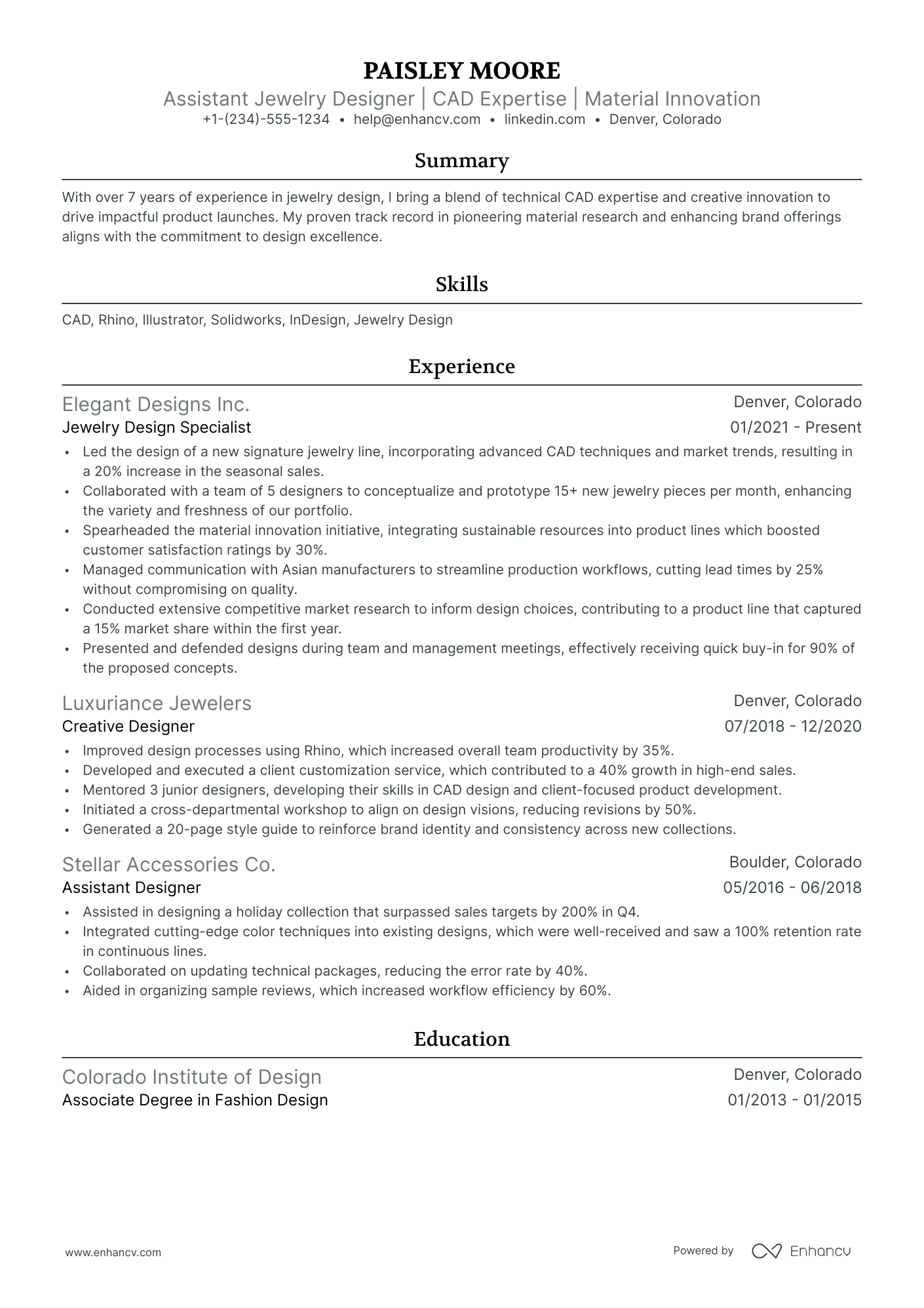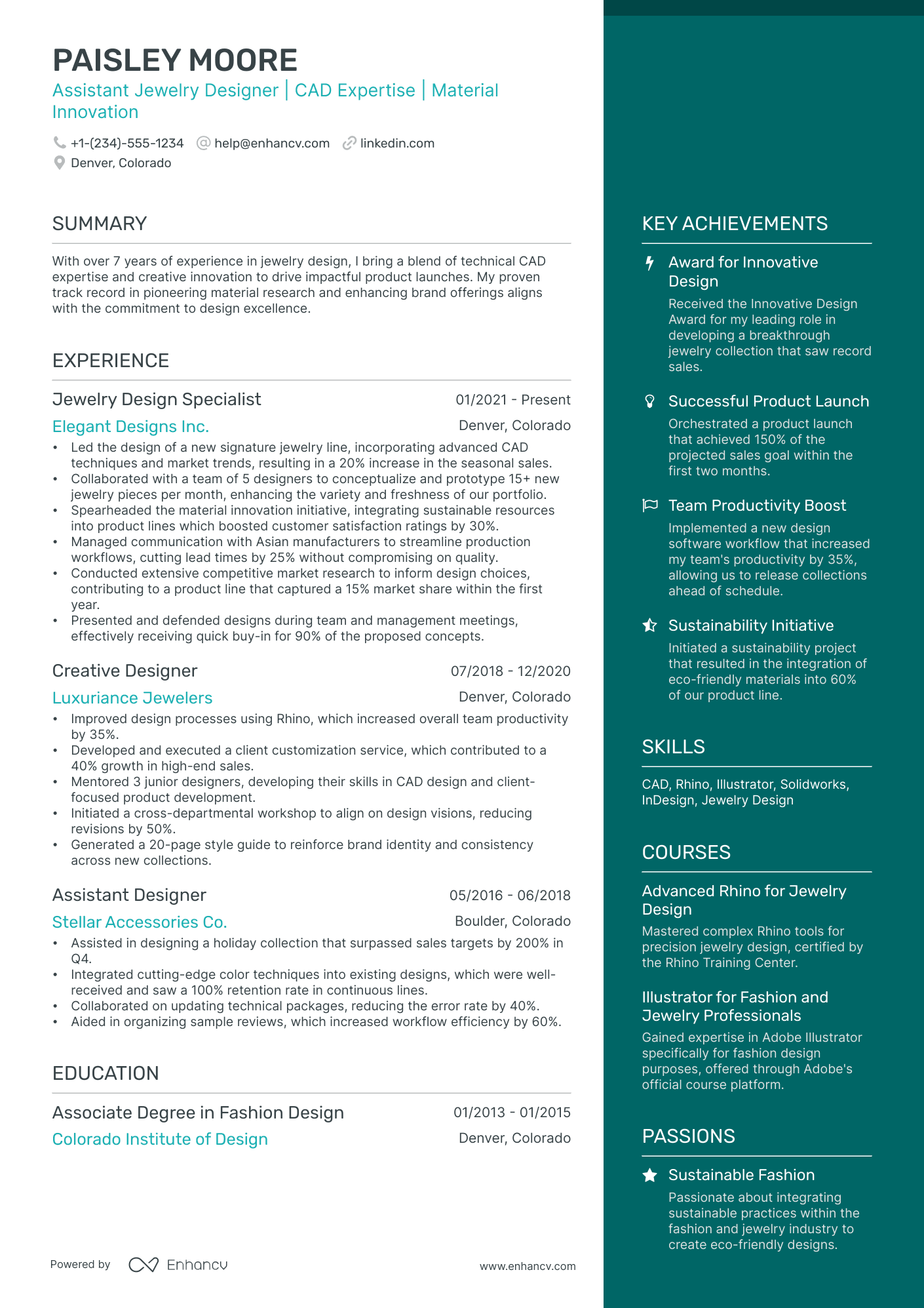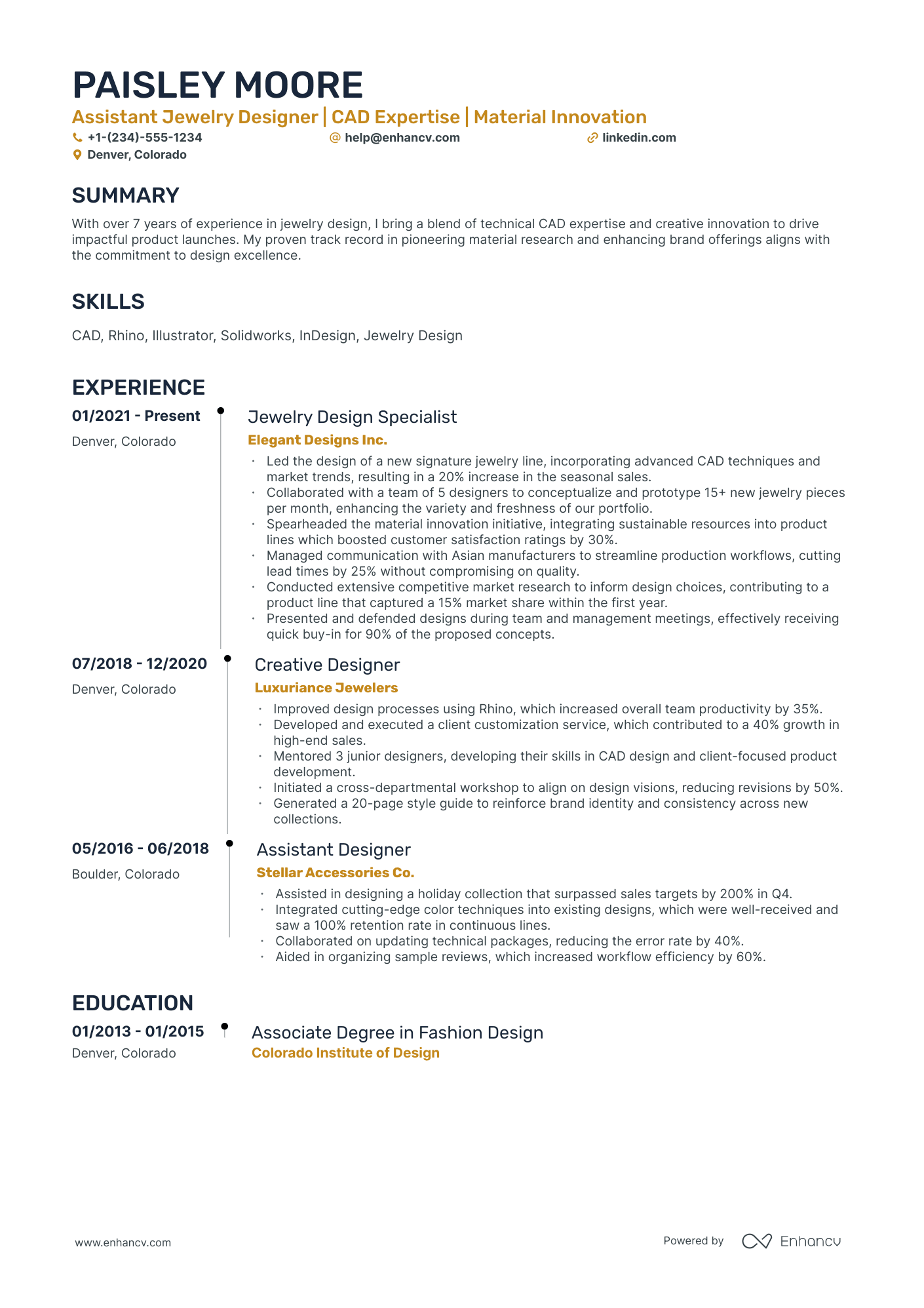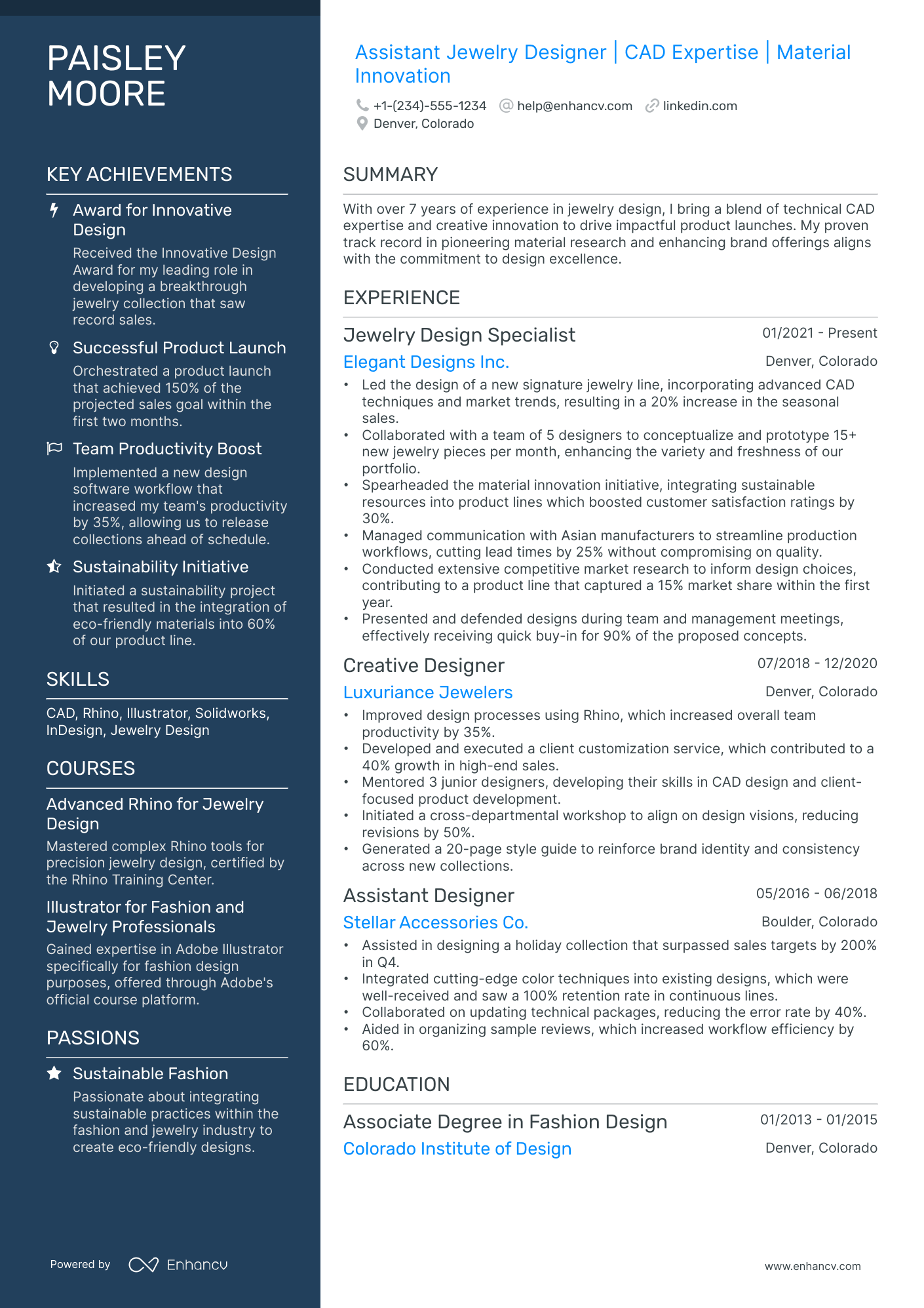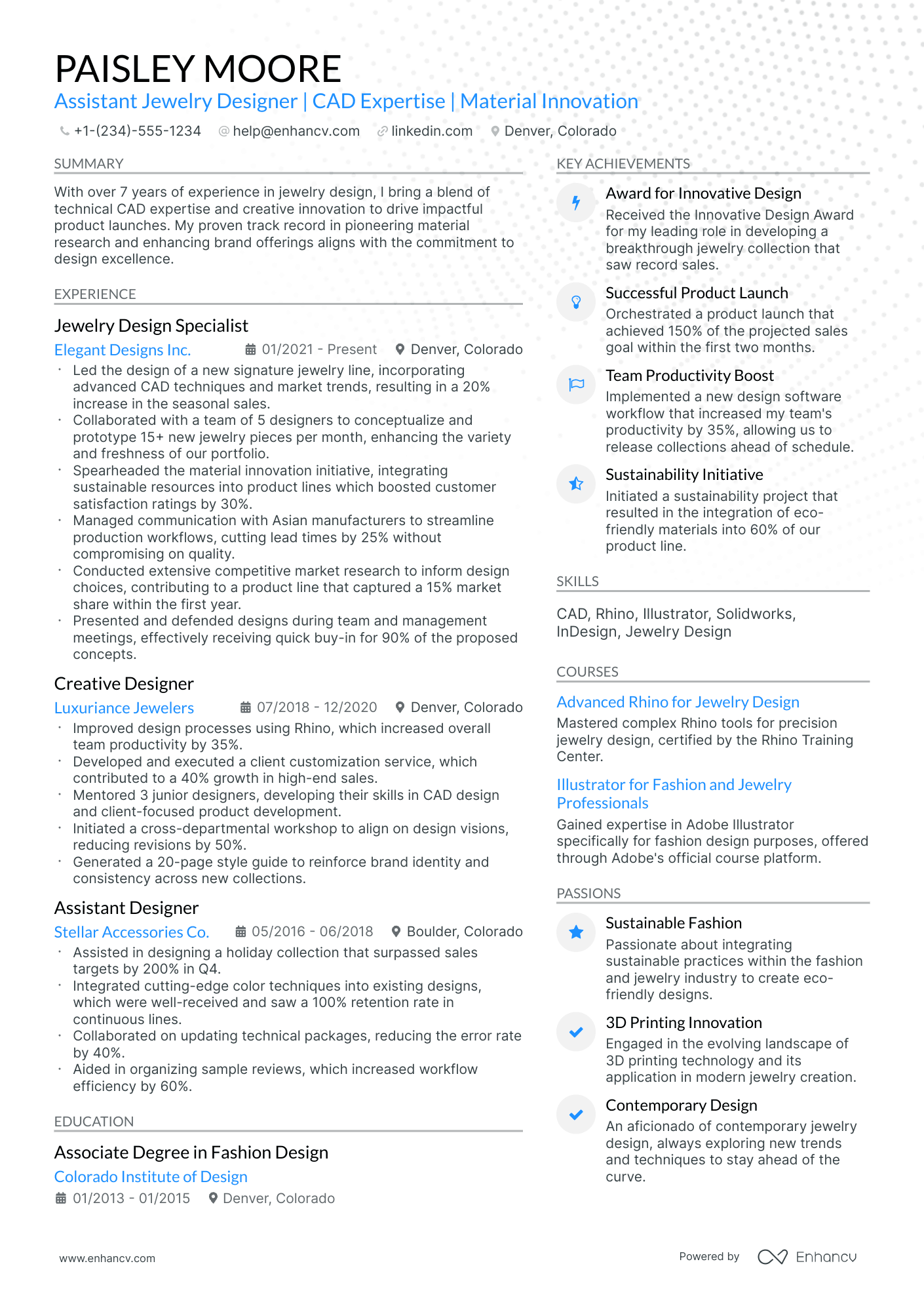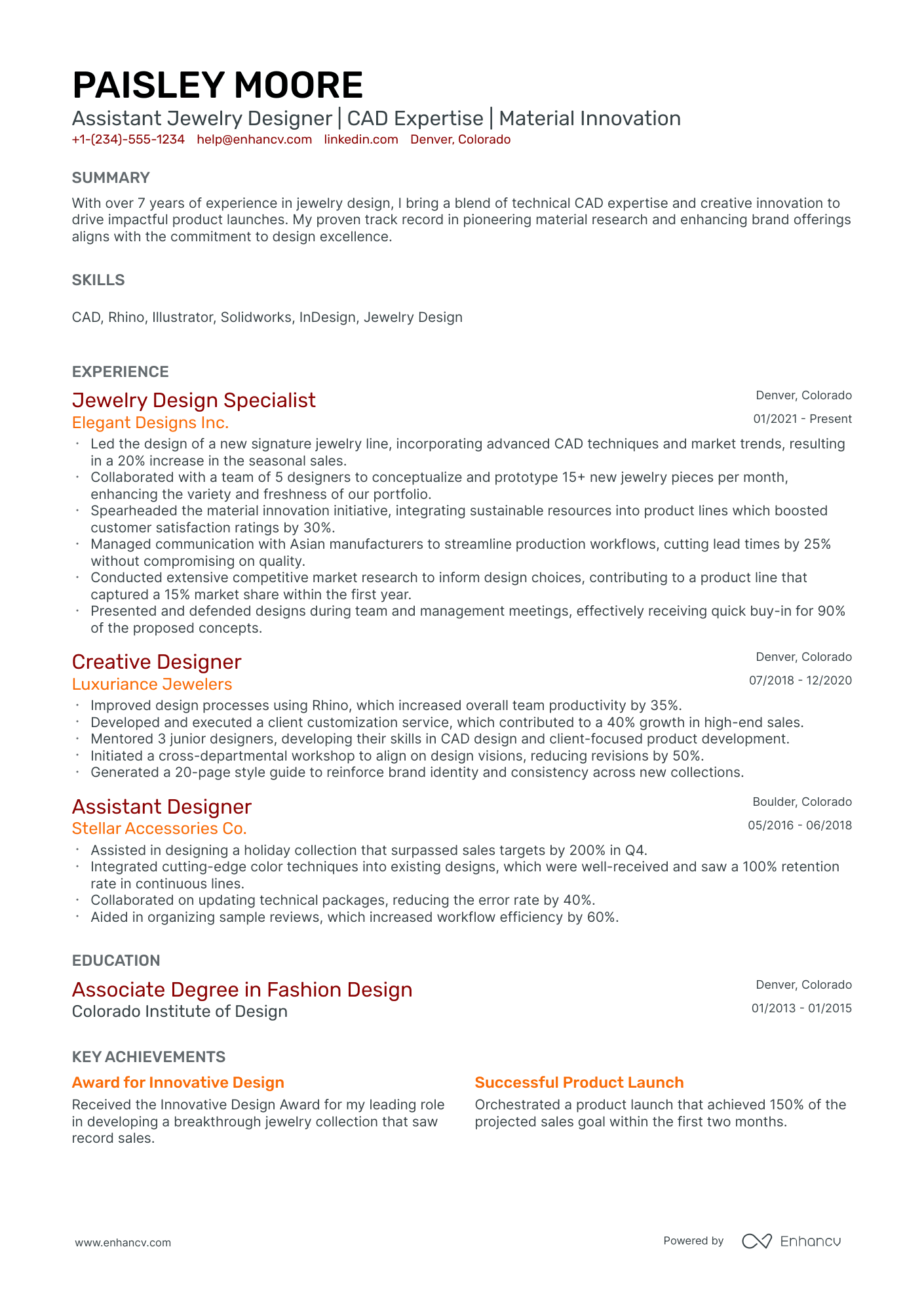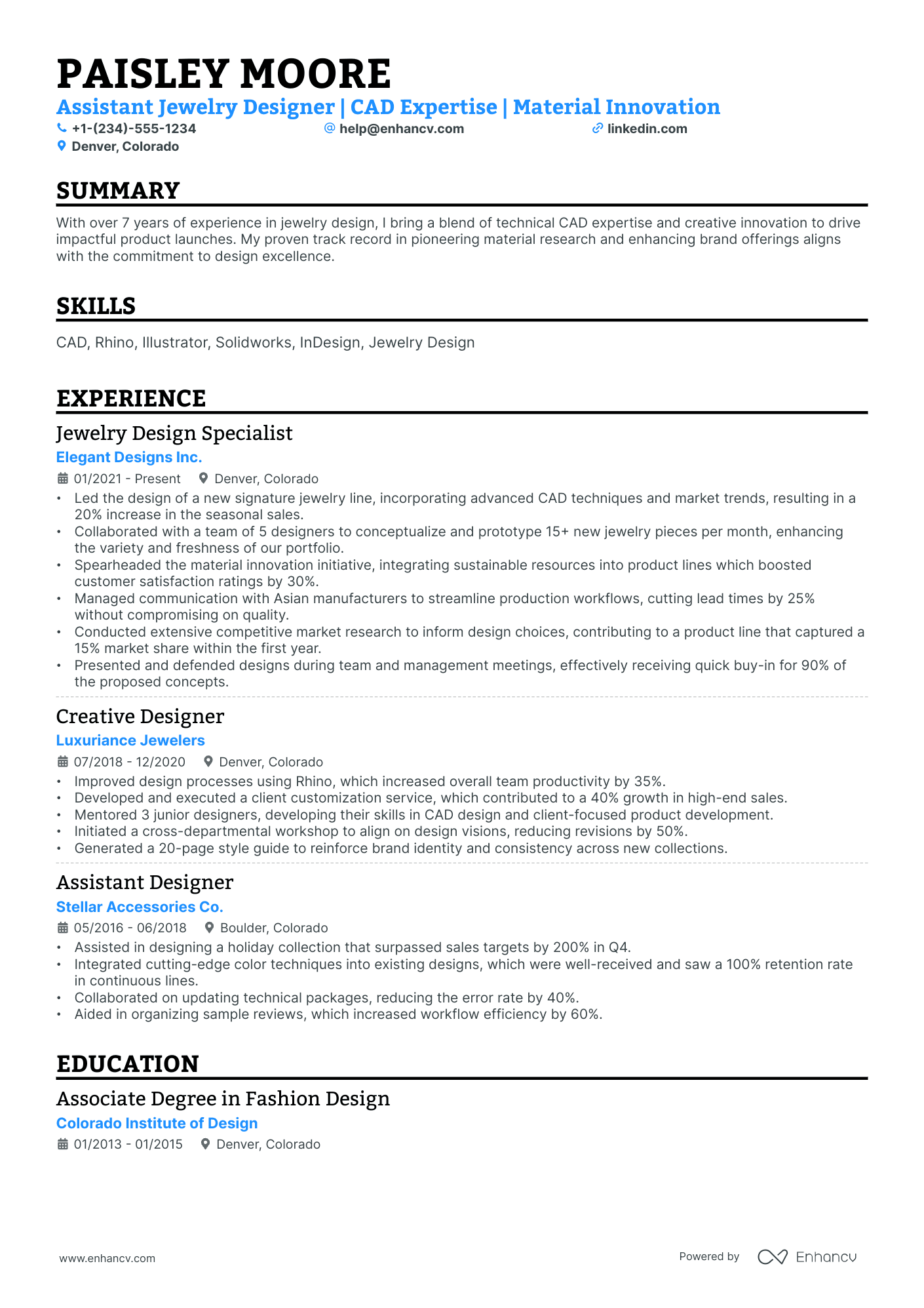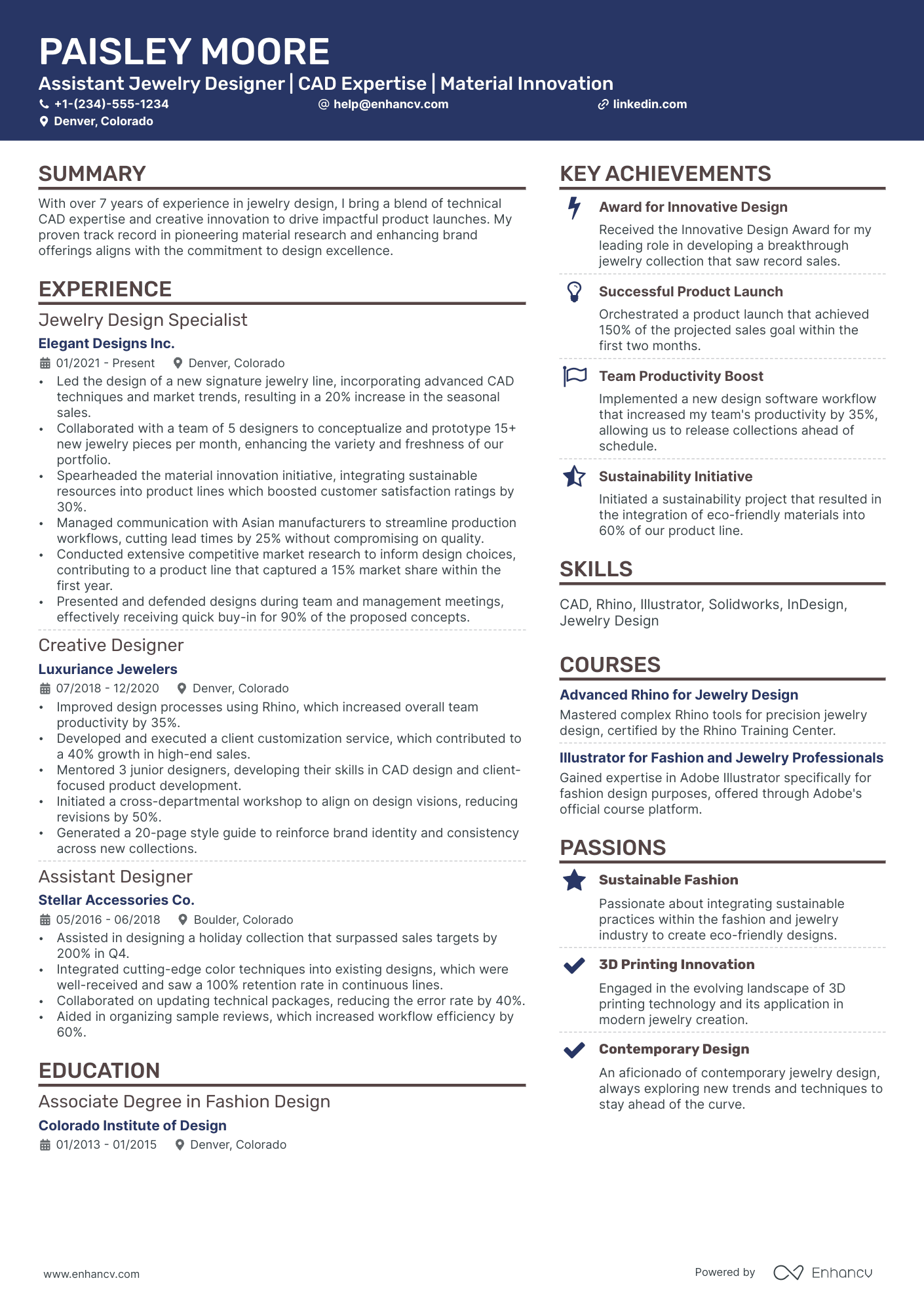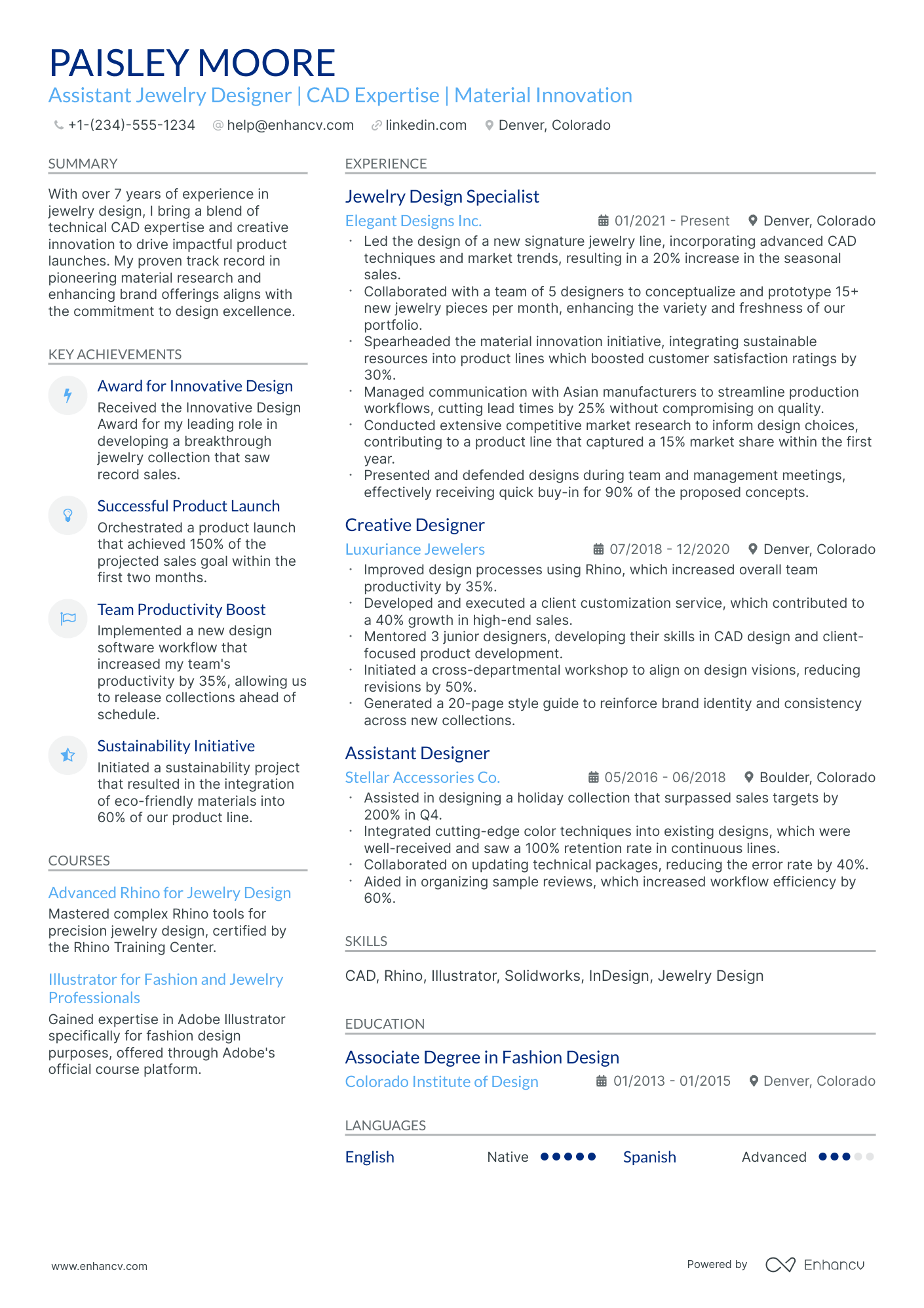As a jewelry designer, effectively highlighting your creative process and unique design skills in a resume can be a formidable challenge. Our guide provides you with step-by-step strategies to craft a compelling narrative that showcases your artistry and experience, ensuring your resume sparkles as much as your creations.
- Utilize real-life examples to refine your jewelry designer resume;
- Effectively write the experience section of your jewelry designer resume, even if you have minimal or no professional experience;
- Incorporate the industry's top 10 essential skills throughout your resume;
- Include your education and certifications to highlight your specific expertise.
If the jewelry designer resume isn't the right one for you, take a look at other related guides we have:
- Video Production Manager Resume Example
- Mechanical Designer Resume Example
- Presentation Designer Resume Example
- Visual Designer Resume Example
- Kitchen Designer Resume Example
- Floral Designer Resume Example
- Lighting Designer Resume Example
- Design Director Resume Example
- 3D Artist Resume Example
- Plumbing Designer Resume Example
Enhancing your jewelry designer resume: format and layout tips
"Less is more" - this principle is key for your jewelry designer resume design. It emphasizes the importance of focusing on why you're the ideal candidate. Simultaneously, it's crucial to select a resume design that is both clear and simple, ensuring your qualifications are easily readable.
Four popular formatting rules (and an additional tip) are here to optimize your jewelry designer resume:
- Listing experience in reverse chronological order - start with your most recent job experiences. This layout helps recruiters see your career progression and emphasizes your most relevant roles.
- Including contact details in the header - make sure your contact information is easily accessible at the top of your resume. In the header, you might also include a professional photo.
- Aligning your expertise with the job requirements - this involves adding essential sections such as experience, skills, and education that match the job you're applying for.
- Curating your expertise on a single page - if your experience spans over a decade, a two-page resume is also acceptable.
Bonus tip: Ensure your jewelry designer resume is in PDF format when submitting. This format maintains the integrity of images, icons, and layout, making your resume easier to share.
Finally, concerning your resume format and the Applicant Tracker System (ATS):
- Use simple yet modern fonts like Rubik, Lato, Montserrat, etc.
- All serif and sans-serif fonts are friendly to ATS systems. Avoid script fonts that look like handwriting, however.
- Fonts such as Ariel and Times New Roman are suitable, though commonly used.
- Both single and double-column resumes can perform well with the ATS.
Each market has its own resume standards – a Canadian resume layout may differ, for example.
Upload & Check Your Resume
Drop your resume here or choose a file. PDF & DOCX only. Max 2MB file size.
PRO TIP
Always remember that your jewelry designer certifications can be quantified across different resume sections, like your experience, summary, or objective. For example, you could include concise details within the expertise bullets of how the specific certificate has improved your on-the-job performance.
Don't forget to include these six sections on your jewelry designer resume:
- Header and summary for your contact details and to highlight your alignment with the jewelry designer job you're applying for
- Experience section to get into specific technologies you're apt at using and personal skills to deliver successful results
- Skills section to further highlight how your profile matches the job requirements
- Education section to provide your academic background
- Achievements to mention any career highlights that may be impressive, or that you might have missed so far in other resume sections
What recruiters want to see on your resume:
- Demonstrated design proficiency with a strong portfolio highlighting individual style and original jewelry pieces.
- Expertise in jewelry manufacturing processes and materials knowledge including precious metals and gemstones.
- Technical skills with jewelry design software such as CAD (Computer-Aided Design) or hand-sketching abilities for concept visualization and creation.
- Experience with craftsmanship techniques, tools, and equipment for jewelry making and repair.
- Understanding of current fashion trends and market demands in the jewelry industry, with a record of successful commercial collections or bespoke designs.
Defining your professional expertise in your jewelry designer resume work experience section
The work experience section, often the most detailed part of your resume, is where you discuss your past roles and achievements. To effectively list your experience, consider these four key tips:
- Align your expertise with the job requirements. It's vital to integrate keywords matching the job criteria to pass initial assessments;
- Show, don’t just tell. Quantify your responsibilities by stating your actual achievements in previous roles;
- Include measurable metrics. For instance, how did your performance impact the annual ROI?
- Highlight crucial industry skills. Mention both technological knowledge and interpersonal skills in this section.
These guidelines will help you craft an impressive jewelry designer resume work experience section that is bound to catch recruiters' attention.
- Designed custom engagement rings and bridal jewelry, leading to a 30% increase in bridal sales for the year 2018.
- Partnered with local artisans to co-create a unique, sustainable jewelry line that represented 15% of the company's annual revenue.
- Instituted a new CAD software training program for the design team, increasing productivity by 20%.
- Managed a team of junior designers and oversaw the creation of a seasonal line which outperformed sales expectations by 45%.
- Streamlined the design process by integrating 3D printing technology, reducing prototype development time by 25%.
- Collaborated with marketing to develop promotional materials for new collections, resulting in a 10% increase in customer engagement on social media.
- Redesigned the company’s signature charm bracelet line, which boosted sales by 30% and became the top-selling product for two consecutive years.
- Initiated and maintained successful collaborations with influencers, expanding brand reach by over 1 million followers on Instagram.
- Drove the adoption of ethically sourced materials in all products, enhancing brand reputation and aligning with corporate social responsibility values.
- Designed a limited-edition luxury watch series that sold out within the first month, contributing to a 35% revenue increase for the luxury division.
- Established a mentorship program for emerging jewelry designers, fostering a culture of learning and innovation.
- Implemented a trend analysis system to anticipate market shifts, enabling quicker adaptation to consumer tastes and a 20% reduction in unsold inventory.
- Spearheaded the design of an iconic collection inspired by vintage aesthetics that accounted for 40% of revenue in the first quarter of release.
- Developed and patented a new clasp mechanism that improved the durability of bracelets and necklaces, recognized as an industry innovation.
- Cultivated partnerships with local mines to ensure the ethical sourcing of raw materials, which enhanced brand integrity and trust.
- Led the product development for an award-winning avant-garde collection that garnered media attention and achieved a sell-through rate of 90%.
- Orchestrated a cross-functional team including designers and gemologists to enhance product quality, reducing returns by 15%.
- Leveraged customer feedback to refine designs and introduced a highly successful bespoke jewelry service that increased customer loyalty by 25%.
- Championed the integration of virtual reality technology for the customization experience in stores, which led to a 50% rise in customer engagement.
- Designed an exclusive collection for a high-profile celebrity partnership, which doubled online sales traffic on launch day.
- Implemented a computer-aided design (CAD) workflow, increasing precision in custom orders and resulting in a 98% customer satisfaction rate.
- Introduced a new gemstone setting technique that became a brand signature and led to a patent filing for the company.
- Curated a series of pop-up events in major cities to showcase new collections, resulting in a significant increase in direct-to-consumer sales.
- Managed end-to-end product lifecycle from conceptual sketches to market launch for over 200 unique jewelry pieces.
The following content includes information from "O*NET OnLine" by the U.S. Department of Labor, Employment and Training Administration (USDOL/ETA). Used under the CC BY 4.0 license. The data represents the top responsibilities present on the task lists for jewelry designer professionals.
Top Responsibilities for Jewelry Designer:
- Sketch rough and detailed drawings of apparel or accessories, and write specifications such as color schemes, construction, material types, and accessory requirements.
- Examine sample garments on and off models, modifying designs to achieve desired effects.
- Confer with sales and management executives or with clients to discuss design ideas.
- Select materials and production techniques to be used for products.
- Provide sample garments to agents and sales representatives, and arrange for showings of sample garments at sales meetings or fashion shows.
- Direct and coordinate workers involved in drawing and cutting patterns and constructing samples or finished garments.
- Identify target markets for designs, looking at factors such as age, gender, and socioeconomic status.
- Collaborate with other designers to coordinate special products and designs.
- Attend fashion shows and review garment magazines and manuals to gather information about fashion trends and consumer preferences.
- Purchase new or used clothing and accessory items as needed to complete designs.
Quantifying impact on your resume
- Include the number of jewelry collections you have designed to showcase the extent of your creative work.
- List the percentage increase in sales or customer engagement from a specific collection you designed to demonstrate your design's market success.
- Mention the number of custom pieces you've created for clients to reflect your ability to meet individual customer needs.
- State the number of design awards or recognitions you have received to underline your industry credibility.
- Quantify the number of successful collaborations with brands or artists to highlight your teamwork and partnership skills.
- Specify the size of teams you have managed or coordinated with, showing your leadership and project management abilities.
- Indicate the number of workshops or training sessions you've conducted to emphasize your role in education and skill development.
- Record the efficiency improvements, such as reduced production time, by implementing new techniques or processes you introduced.
Action verbs for your jewelry designer resume
Experience section for candidates with zero-to-none experience
While you may have less professional experience in the field, that doesn't mean you should leave this section of your resume empty or blank.
Consider these four strategies on how to substitute the lack of experience with:
- Volunteer roles - as part of the community, you've probably gained valuable people (and sometimes even technological capabilities) that could answer the job requirements
- Research projects - while in your university days, you may have been part of some cutting-edge project to benefit the field. Curate this within your experience section as a substitute for real-world experience
- Internships - while you may consider that that summer internship in New York was solely mandatory to your degree, make sure to include it as part of your experience, if it's relevant to the role
- Irrelevant previous jobs - instead of detailing the technologies you've learned, think about the transferable skills you've gained.
Recommended reads:
PRO TIP
If you failed to obtain one of the certificates, as listed in the requirements, but decide to include it on your resume, make sure to include a note somewhere that you have the "relevant training, but are planning to re-take the exams". Support this statement with the actual date you're planning to be re-examined. Always be honest on your resume.
In-demand hard skills and soft skills for your jewelry designer resume
A vital element for any jewelry designer resume is the presentation of your skill set.
Recruiters always take the time to assess your:
- Technological proficiency or hard skills - which software and technologies can you use and at what level?
- People/personal or soft skills - how apt are you at communicating your ideas across effectively? Are you resilient to change?
The ideal candidate presents the perfect balance of hard skills and soft skills all through the resume, but more particular within a dedicated skills section.
Building your jewelry designer skills section, you should:
- List up to six skills that answer the requirements and are unique to your expertise.
- Include a soft skill (or two) that defines you as a person and professional - perhaps looking back on feedback you've received from previous managers, etc.
- Create up to two skills sections that are organized based on the types of skills you list (e.g. "technical skills", "soft skills", "jewelry designer skills", etc.).
- If you happen to have technical certifications that are vital to the industry and really impressive, include their names within your skills section.
At times, it really is frustrating to think back on all the skills you possess and discover the best way to communicate them across.
We understand this challenge - that's why we've prepared two lists (of hard skills and soft skills) to help you build your next resume, quicker and more efficiently:
Top skills for your jewelry designer resume:
CAD Software (e.g., Rhino, Matrix, JewelCAD)
Metalworking Techniques
Gemology
3D Printing
Casting Techniques
Soldering
Engraving
Wax Sculpting
Jewelry Photography
Stone Setting
Creativity
Attention to Detail
Communication
Time Management
Problem-Solving
Collaboration
Customer Service
Adaptability
Project Management
Artistic Vision
Next, you will find information on the top technologies for jewelry designer professonals from "O*NET OnLine" by the U.S. Department of Labor, Employment and Training Administration (USDOL/ETA). Used under the CC BY 4.0 license.
Top technologies for Jewelry Designer’s resume:
- Autodesk Revit
- Trimble SketchUp Pro
- Microsoft PowerPoint
- Adobe Creative Cloud software
- Adobe Illustrator
PRO TIP
Showcase any ongoing or recent educational efforts to stay updated in your field.
Showcase academic background with education and certifications' sections
Listing your education and certifications should be a rudimentary part of your resume writing.
Including your relevant academic background - in the form of your higher education degree and niche-specific certificates - will prove knowledge of the industry.
For your education section:
- Start by including your degree, followed by start and graduation dates, as well as the institution;
- You could include relevant coursework, major/minor , or GPA, only if your've just graduated from college or if this information would further support your application;
- If you have an "ongoing" degree, you can still list it in case you think your diploma can impress recruiters or it's required;
Follow a similar logic for your certifications section by listing the institution, alongside dates you've obtained the certificate. For some of the most recent and relevant industry certificates , check out the next part of our guide:
The top 5 certifications for your jewelry designer resume:
- Gemological Institute of America Certified (GIA) - Gemological Institute of America
- Registered Jeweler (RJ) - American Gem Society
- Certified Gemologist (CG) - American Gem Society
- Jewelry Design Certificate (JDC) - Jewelry Design Professionals' Network
- Professional Jeweler's Diploma (PJD) - Jewelers of America
The content below includes information from "O*NET OnLine" by the U.S. Department of Labor, Employment and Training Administration (USDOL/ETA). Used under the CC BY 4.0 license. The data represents the top associations for jewelry designer professionals.
Top US associations for a Jewelry Designer professional
- Costume Designers Guild
- Council of Fashion Designers of America
- Fashion Group International
- National Association of Schools of Art and Design
- The Underfashion Club
PRO TIP
Listing your relevant degrees or certificates on your jewelry designer resume is a win-win situation. Not only does it hint at your technical capabilities in the industry, but an array of soft skills, like perseverance, adaptability, and motivation.
Recommended reads:
Which one to use: a resume summary or a resume objective?
The jewelry designer resume summary or objective serves as a good introduction to your experience for recruiters.
Have you ever wondered which one (the summary or objective) will be more appropriate for your jewelry designer resume?
- If you are a less experienced professional, write a resume objective statement. The objective is about three sentences long and provides recruiters with information about your career goals, strengths, and achievements . It should basically denote how you see yourself in this particular role, and what is your relevant experience and/or know-how;
- If you happen to have plenty of relevant experience, select your most impressive achievements for your resume summary. The summary is no longer than five sentences and serves as a storytelling instrument - highlighting your greatest career wins . Don't forget to align your summary with the job requirements to ensure your resume stays relevant to the role.
Read on for more information and examples of resume summaries and objectives from real world professionals.
Resume summaries for a jewelry designer job
- With over a decade of intricate craftsmanship, I have developed a profound expertise in jewelry design, specializing in custom engagement rings and statement pieces. My portfolio showcases a blend of traditional techniques and modern aesthetics, punctuated by the successful launch of a bridal jewelry line that resulted in a 25% increase in sales for my previous employer.
- Acclaimed graphic designer transitioning into jewelry design, bringing a unique blend of creativity and digital design experience. Over 7 years of expertise in creating visually compelling digital artwork, now seeking to apply a keen eye for design towards innovating stunning, wearable art pieces that resonate with contemporary style trends.
- Seasoned professional with 20 years in the fashion industry, including 5 years focused on accessory creation, venturing into jewelry design with a passion for merging fashion trends with timeless elegance. Recognized for curating successful seasonal accessory lines that garnered rave reviews and boosted consumer engagement by 30% year-over-year.
- Eager to transition my career from high-end retail management to the creatively fulfilling practice of jewelry design. I bring 3 years of experience in managing luxury retail operations, including a strong foundation in customer service, inventory management, and a personal appreciation for the art of fine jewelry and design principles.
- As a recent graduate with a Bachelor's degree in Fine Arts and a specialization in metalwork, I am enthusiastic about applying my academic knowledge and fresh perspective to create exquisite, handcrafted jewelry pieces. Eager to learn from seasoned professionals and contribute to a vibrant, quality-focused design team.
- Artistic individual with a passion for craftsmanship, seeking to leverage a robust background in sculpture and a recently acquired certification in gemology. My objective is to contribute a fresh vision and meticulous attention to detail in designing unique, high-quality jewelry pieces that will enchant and captivate clients.
Optimize your resume summary and objective for ATS
Drop your resume here or choose a file.
PDF & DOCX only. Max 2MB file size.
Average salary info by state in the US for jewelry designer professionals
Local salary info for Jewelry Designer.” Source: My Next Move, National Center for O*NET Development. Accessed 10/15/2024
| State | Average Salary (in USD) |
|---|---|
| US National Average | $79,290 |
| Texas (TX) | $35,150 |
| Florida (FL) | $60,430 |
| New York (NY) | $80,780 |
| Pennsylvania (PA) | $78,720 |
| Illinois (IL) | $63,970 |
| Ohio (OH) | $79,500 |
| Georgia (GA) | $79,560 |
| North Carolina (NC) | $64,750 |
| Michigan (MI) | $56,660 |
Other jewelry designer resume sections to support your expertise and skills
Recruiters are always on the lookout for that jewelry designer candidate who brings about even more value to the role.
This can be either via their personality or additional accreditations they have across the industry.
Add to your resume any of the four sections that fit your profile:
- Projects for your most impressive, cutting-edge work;
- Awards or recognitions that matter the most;
- Publications further building up your professional portfolio and accreditations;
- Hobbies and interests to feature the literature you read, how you spend your time outside of work, and other personality traits you deem may help you stand out .
Key takeaways
- Your jewelry designer resume is formatted professionally and creates an easy-to-read (and -understand) experience for recruiters;
- You have included all pertinent sections (header, summary/objective, experience, skills, certifications) within your jewelry designer resume;
- Instead of just listing your responsibilities, you've qualified them with skills and the results of your actions;
- Within your jewelry designer resume, you've taken the time to align specific job requirements with your unique expertise, showcasing the value you can provide as a professional;
- Technologies and personal skills are featured across different sections of your jewelry designer resume to achieve the perfect balance.
